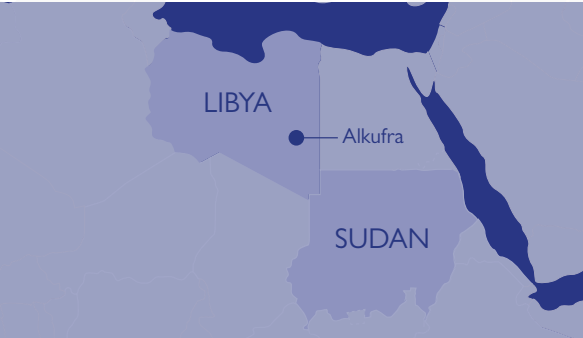‘Miserable conditions’ for Sudanese in Libya

Map showing Kufra, near the Libyan-Sudanes border (Source: IOM)
An influx of Sudanese refugees fleeing to Libya via the southeastern Kufra crossing has prompted warnings of an impending humanitarian disaster, if aid is not urgently provided.
Mohamed Younis, a lecturer at the Kufra branch of the University of Benghazi, and a community leader for Sudanese residing in Kufra, told Dabanga that most refugees from Sudan arrive in Libya via the Kufra crossing,
Refugees in the area face “miserable” humanitarian conditions, and lack proper shelters, which forces many to seek refuge on unprepared farmland and other vacant lands. “While grassroots efforts have supplied around 2,000 refugees with food and blankets, this remains insufficient”, Younis said.
Sudanese who resided in Kufra before the war are “now accommodating two to three families each”, and the Libyan National Army (LNA) is reportedly distributing food, blankets, clothing, and sanitary provisions to 10,000 refugees.
Abdallah Suleiman, spokesperson for the Kufra municipal council, said in a press statement yesterday that “Sudanese refugees have begun to flock to Kufra in significant numbers, while the two governments of Libya have not taken any specific measures to address the crisis”.
The municipality is struggling to meet the needs of the newcomers due to its limited capabilities and has formed an emergency committee to address the issue, according to Suleiman.
Reports from Kufra indicate a three-fold increase in rental prices, soaring up to 2,000 Libyan Dinars per month, as well as escalating prices of food and fuel, accompanied by shortages. With a population of 60,000, Kufra lacks the capacity to accommodate the influx of refugees.
As previously reported by Dabanga, more than 230 Sudanese died, 700 families lost their shelter, and scores more went missing, after floods struck the Libyan city of Derna on September 4 of last year.
According to the latest International Organisation for Migration (IOM) Sudan Weekly Displacement Snapshot, more than 6,100 people have fled Sudan to Libya, with 82 per cent of them being of Sudanese origin, as of February 11.











 and then
and then